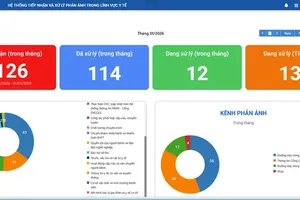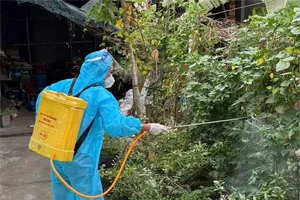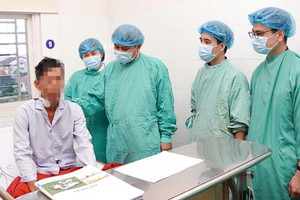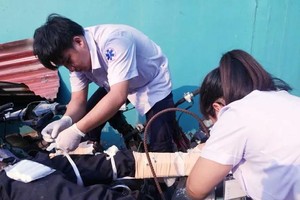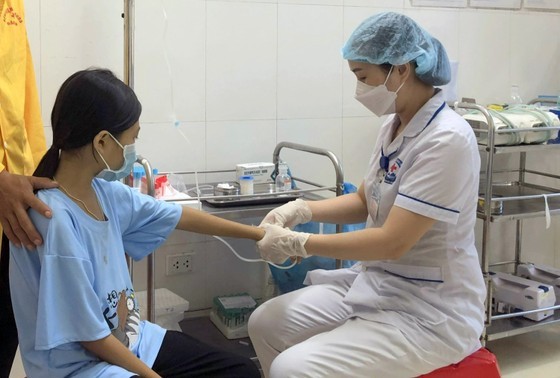
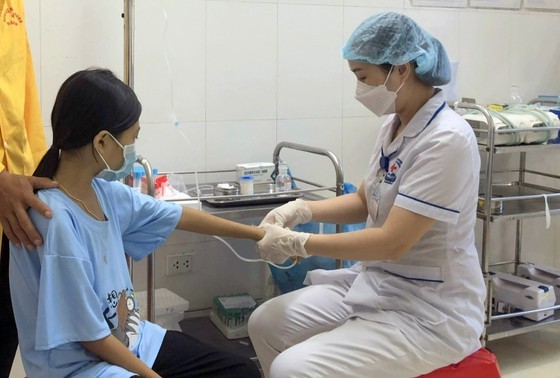 A medical worker examines a student in Bac Kan
A medical worker examines a student in Bac Kan
According to Mr. Tac Van Nam, Director of the Department of Health of Bac Kan province, after noticing that many children in Cho Don District had a fever and had to be hospitalized for treatment, the provincial Center for Disease Control (CDC) took 7 samples. The samples were transferred to the Central Institute of Hygiene and Epidemiology for testing and the results showed that they were positive for influenza B. This is a common infectious disease but it will develop serious complications if patients don’t receive timely treatment.
Currently, the epidemic situation has been basically controlled, and the risk of spreading to the community is low.
Moreover, rapid weather variability increases influenza epidemic risk, creating favorable conditions for bacteria and viruses to thrive and cause diseases, especially in children due to their weak resistance. Kids are very susceptible to infectious diseases in transitional seasons. Therefore, Mr. Tac Van Nam advised parents and schools to regularly monitor their children's health, if children have a fever and unusual signs, they must be taken to a medical facility for care and treatment.
A representative of the Bac Kan Department of Health also said that from mid-October, people in communes in Cho Don District have been infected with the influenza virus, mainly at Bang Lung Town Primary School. By October 26, 736 students had to miss school due to illness and fever and 109 of them had to go to the district health center for treatment. As of October 27, 667 students had to ask for school leave because they were infected with the virus. Presently, 70 kid patients are being treated in infirmaries but no patient had severe symptoms.
An 8-year-old student of Bang Lung Town Primary School was admitted to the Emergency Department’s Health Center on the morning of October 24 in a coma, and cyanosis while the kid was experiencing a high fever. This patient was treated for emergency and resuscitation but to no avail and died on the same day.
The results of the epidemiological investigation showed that the kid had fatigue, so the kid’s parents asked for school leave from October 22. The kid had symptoms of fever and sore throat without contact with livestock and poultry. On October 23, the family brought the kid to a private clinic where doctors gave the kid intravenous fluids and fever-reducing medicine, and then the child was sent home on the same day. However, on the next day, the kid was discovered to turn pale and the climbs were cold; thus, the parents immediately took the kid to the emergency room.
At this point, the National Institute of Hygiene and Epidemiology and the National Children's Hospital will send experts to support the province and Cho Don District to stamp out the epidemic. However, the epidemic development is complicated and children under 16 years old easily catch the disease, so severe cases are predicted to discover.
Therefore, with the support of the central government, localities in the province need to step up prevention measures, and at the same time ensure the conditions of emergency and timely treatment.
The provincial Department of Health assigned the Bac Kan General Hospital to proactively prepare conditions and be ready to receive and treat cases as well as take measures to prevent infection in the hospital. Communication of the disease should be increased to raise people’s awareness of disease prevention, personal hygiene, and environmental sanitation.
People are advised to go for full vaccination as prescribed. Local medical workers should provide screening for people with symptoms of fever, cough, sore throat, and tired people for timely treatment.











